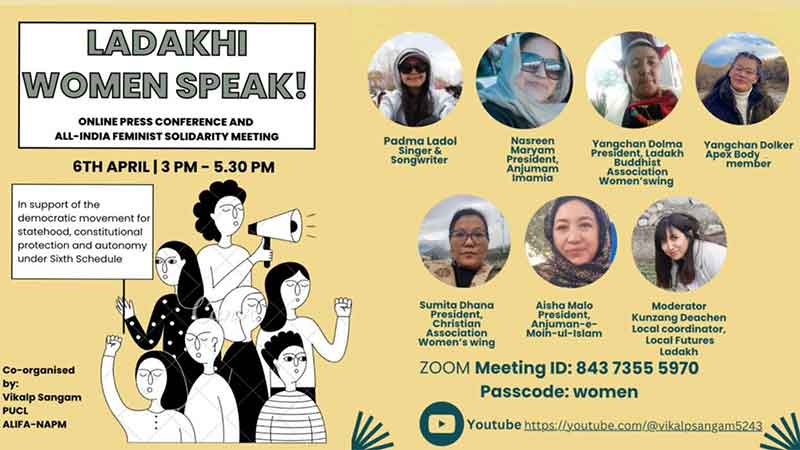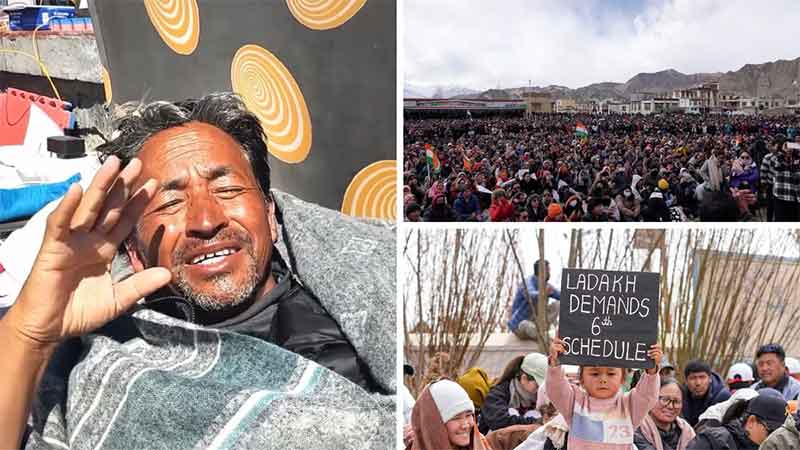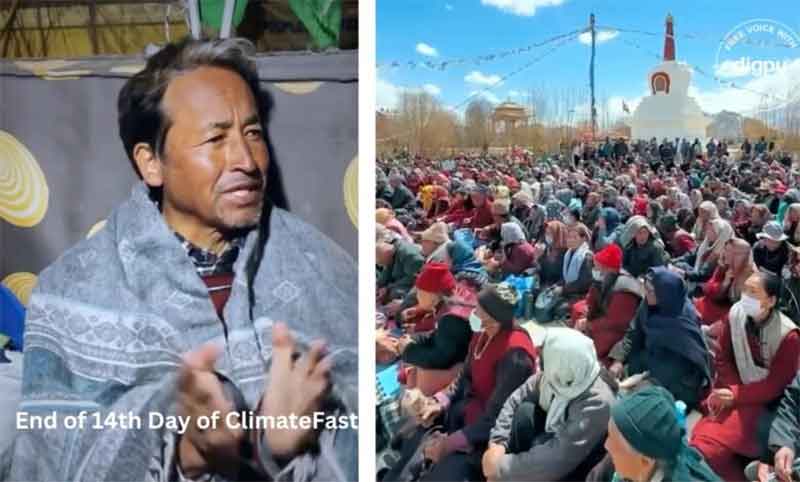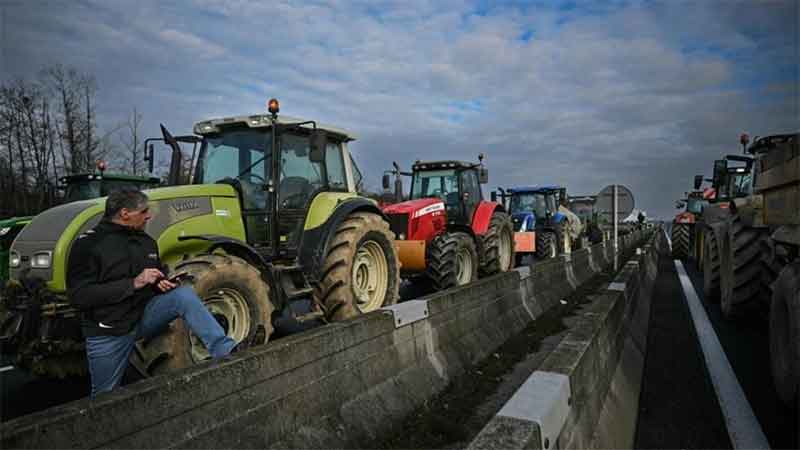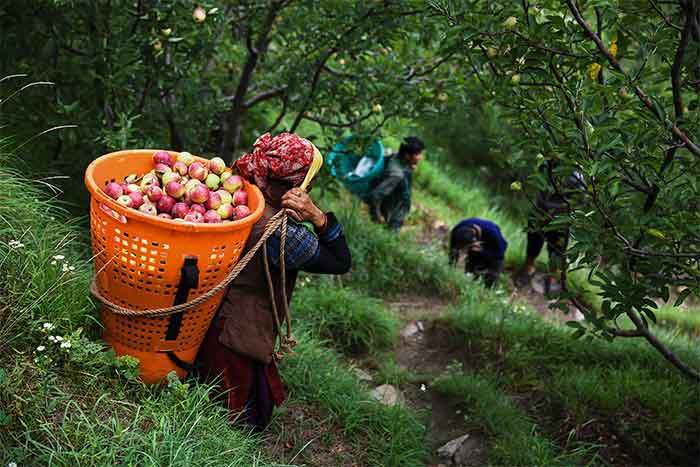Written by Kunzang Deachen, Chozin Palmo and Jigmet Singge
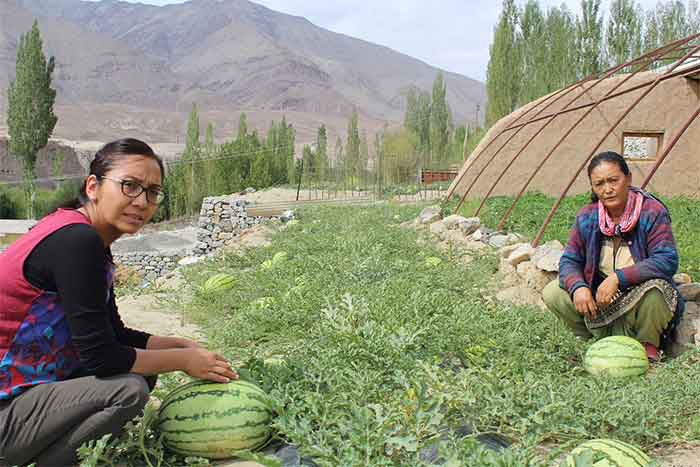
Ladakh – high on the Tibetan Plateau at the northern extreme of India – is the place we call home.
The vast majority of Ladakhis are villagers, who have, for centuries, provided for most of their physical and emotional needs through interdependent webs of relationship with the land and with community. We remember running through fields as children, picking freely from the orchards of apples and apricots that we came across as we played.
Significant changes took place when Ladakh was opened by the Indian government, first for the army, then for travellers from all around the world. Increasingly, Ladakh was pressured to conform to national development models, and to integrate into the Indian and global economies. Government jobs and tourism offered money-making opportunities and more luxurious lifestyles in Ladakh’s capital city, Leh, as well as in bigger Indian towns and cities outside Ladakh. At the same time, the Public Distribution System (PDS) brought in highly subsidised grain, so agriculture quickly became uneconomic.
These changes have strongly influenced the way people think and make a living, over time causing a decline of village and local agriculture, changing diets to depend more on food imports, and increasing the pace of urbanisation. As we explore in our recent short film – ‘Young Farmers in Ladakh’ – the implications of these changes for long-term cultural survival, local economic sustainability, and food security are concerning. Watch below or on YouTube
Like us, most young people in Ladakh have been trained in English and business and computer sciences, and we do not have the full set of skills our grandparents had – like growing food, making clothes, building houses, and living in community. Our modern “education” presupposes the availability of plentiful employment opportunities in the modern business sector, dependable imports of food from the Indian plains and beyond, and the plausibility of ongoing urbanisation and conversion of land from agriculture to buildings and infrastructure. However, we believe all these assumptions are questionable in the face of existential challenges like global climate change, pandemics, and the massive disruptions to food supply chains caused by lockdowns.
Westernisation has come with a lot of glamour and promises of affluence, but today, many younger people are beginning to realise that the chase for modernity and glamour brings little more than dissatisfaction, disconnection, and feelings of addiction.
From deep within us, there is a rising desire to rebuild connection to nature and to other people, and to live in simpler, slower and more meaningful ways. With growing awareness of the problems with the capitalist economic system and western colonialism, many of us have a renewed appreciation of ancient ways.
Now, we are among the growing ranks of young Ladakhis who are returning to Ladakh with the desire to contribute to a new form of progress for the region. Younger people like us do not want Ladakh to become like Delhi or Bangalore. We have seen behind the mirror of industrial modernity, and eschewed consumer values in favour of a commitment to sustainability, justice, health and spiritual wellbeing.
We are realising the true value of working on the land to grow food – an activity that has been the cornerstone of Ladakhi culture forever. A young farmers’ movement is emerging in Ladakh – a movement that we showcase and celebrate in our film.
“Preparing a meal with the vegetables that I picked with my own hands gives me a different level of satisfaction” expresses Tashi Chosgon, a local entrepreneur.
“My main motivation to get into farming was to encourage our youngsters and show them the importance of agriculture,” explains Sonam Angmo, a pioneer of the young farmers’ movement.
In some clear ways, this movement has been strengthened by the pandemic, which highlighted the vital importance of local food systems to our survival. “In these few months, I’ve realised how important our traditions are … I can feel a change within me,” describes Tsetan Dolma, who runs a local food outlet selling produce and meals from her native village.
Of course there are still challenges, as there are for young farmers everywhere. The engine of “development” is still pushing strongly to increase tourism and import a corporate consumer culture. But we are encouraged by the enthusiastic reaction to our film at a recent event we organised to discuss these issues. The event featured a screening of the film, a lively panel discussion, a delicious local food lunch provided by a local restaurateur, and a display of local and traditional food products. Perhaps most encouraging was the reception of the agriculture minister, who seems genuinely concerned about the loss of Ladakh’s agrarian culture and food sovereignty, and is keen to pursue a food system localisation policy agenda.
In one way, Ladakh is luckier than the rest of the world: because globalisation happened so fast, the ancient ways are not yet forgotten. At the 2019 Economics of Happiness conference in Ladakh, Keibo Oiwa from Japan lamented the fact that in his country there are few villages to go back to, so relocalisation there is much more challenging than in a place like Ladakh.
Here, we still have villages and living ancestral knowledge. Young farmers can learn from their grandparents’ traditions, as well as experimenting with new crop varieties and new organic techniques.
That’s why we have been organising agriculture-related workshops for Ladakhi youth, on everything from vermi-composting to mushroom cultivation, and we plan to do more on vegetable gardening, field cultivation, reviving traditional processing techniques, and more. These workshops are a venue for invaluable intergenerational learning.
Through this effort, we hope to step back from the mad rush of modernity, take stock of where we are, and rebuild a local food future based on the wisdom of our traditions.
is from Ladakh, and joined the Local Futures Ladakh team in the summer of 2019 to help coordinate the Ladakh Economics of Happiness conference. In 2017, she left a job in Delhi and started Infinity Ladakh to encourage spiritual and physical well-being by promoting yoga, meditation and nature expeditions.
Originally published by Local Futures
GET COUNTERCURRENTS DAILY NEWSLETTER STRAIGHT TO YOUR INBOX

